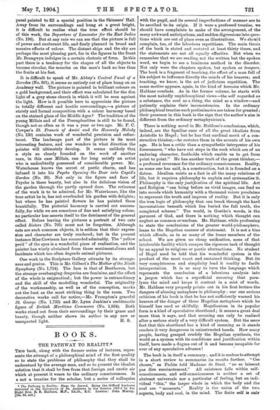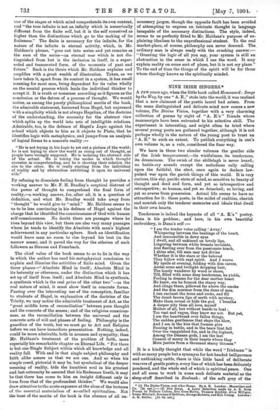This book, along with the former series of lectures, repre-
sents the attempt of a philosophical mind of the first quality so to state the problems of philosophy that they shall be understood by the average man, and so to present the idealist solution that it shall be free from that foreign and exotic air which at present it wears to the ordinary consciousness. It a not a treatise for the scholar, but a series of colloquies
• The Pathway to Reality : Stage the Second. Being the Gifford Lectures delivered in the University of St. Andrews in the Session 1903-4 by the Bight Hon. B. B. Haldane, M.P., LL.D., K.C. London : John Murray. [10s. 6d. net.) with the pupil, and its several imperfections of manner are to be ascribed to its origin. If it were a professed treatise, we should have complaints to make of the arrangement, of the many awkward anticipations, and sudden digressions into ques- tions which are out of place even as illustrations. We should complain, too, of the laborious repetitions. The main thesis of the book is stated and restated at least thirty times, and the statements are not all equally effective. But when we remember that we are reading not the written but the spoken word, we begin to see a luminous method in the disorder. Not only were the chapters spoken, but spoken ex tempore. The book is a fragment of teaching, the effort of a man full of his subject to influence directly the minds of his hearers ; and teaching, we know, is the art of judicious repetition. The same motive appears, again, in the kind of heresies which Mr. Haldane combats. As in the former volume, he starts with the most nakedly unphilosophical views—the self regarded as a substance, the soul as a thing, the mind as a window—and patiently explains their inconsistencies. In the ordinary philosophical treatise such preliminaries are taken for granted ; their presence in this book is the sign that the author's aim is different from the ordinary metaphysician's.
There is nothing novel in Mr. Haldane's conclusions, which, indeed, are the familiar ones of all the great idealists from Aristotle to Hegel ; but he has that cardinal merit of a con- structive thinker,—he restates them in the accents of his own age. He is less a critic than a sympathetic interpreter of his forerunners, " who have cut steps in the rock which are of an enduring character, footholds which enable us to get from point to point." He has another trait of the great thinker,— a profound reverence for the ordinary consciousness. Reality, as some one has said, is a construction, but it is founded on a datum. Idealism exists as a fact in all the many relations of life, but it requires philosophy to explain and systematise it. Philosophy is the only justification of the spiritual life. Art and Religion "can bring before us vivid images, can read us into moods which humanity with a thousand voices proclaims to represent the truth and impress of reality. But it is only the iron logic of philosophy that can break through the hard incrustations beneath which lies buried the full truth, the completed scheme." The world, in Goethe's words, is the garment of God, and there is nothing which thought can neglect as common or unclean. Mr. Haldane, while professing to state the conclusions of the greater world-philosophers, leans to the Hegelian manner of statement. It is not a bias which offends, as in so many of the lesser members of the schooL We are given no cheap unification, none of that intolerable facility which escapes the rigorous task of thought by an appeal to religious or poetic abstractions. No student of Hegel need be told that his wonderful system is the product of the most exact and sustained thinking. But its very completeness and simplicity lend it readily to facile interpretation. It is so easy to turn the language which represents the conclusion of a laborious analysis into a jargon which has a superficial meaning that para- lyses the mind and keeps it content in a mist of words. Mr. Haldane very properly points out in his first lecture the dangers of abusing metaphors in philosophy : our one serious criticism of his book is that he has not sufficiently warned his hearers of the danger of those Hegelian metaphors which be himself has used so skilfully. Hegelianism in its popular form is a kind of speculative shorthand ; it means a great deal more than it says, and that meaning can only be realised after a serious study of a very difficult system. But the mere fact that this shorthand has a kind of meaning as it stands renders it very dangerous in uninstructed hands. How many people, having grasped crudely the Hegelian synthesis, the world as a system with its conditions and justification within itself, have made a dogma out of it and become incapable for ever of any speculative advance The book is in itself a summary ; and it is useless to attempt in a short review to summarise its results further. " Ces choses," as Fichte told Madame de Stiel, " ne se 'aliment pas dire succinctement." All existence falls within self- consciousness, and self-consciousness is neither a set of abstract universals nor a particular of feeling, but an indi- vidual "this," the larger whole in which the body and the soul are " moments." Reality is the union of the two aspects, body and soul, in the mind. The finite self is only
one of the stages at which mind comprehends its own content, and "the true infinite is not an infinity which is numerically different from the finite self, but it is the self conceived as higher than the distinctions which go to the making of its finiteness." The finite is necessary for the infinite, for the nature of the infinite is eternal activity, which, in Mr. Haldane's phrase, " goes out into series and yet remains as the sum of the series—an eternal now which is not dis- tinguished from but is the inclusion in itself, in a super- seded and transmuted form, of the moments of past and future." Such is the thesis which Mr. Haldane explains and amplifies with a great wealth of illustration. Taken, as we have taken it, apart from its context in a system, it has small meaning for most men, being dependent for its value wholly on the mental process which leads the individual thinker to accept it. It is truth or nonsense according as it figures as the conclusion or the datum of a process of thought. We would notice, as among the purely philosophical merits of the book, the admirable statement, borrowed from Hegel, but expressed with a simplicity which is not always Hegelian, of the doctrine of the understanding, the necessity for the abstract view which splits up the world into sets of intelligible relations.
Admirable, too, is the defence of Hegel's Logic against the school which objects to him as it objects to Plato, that he identifies logic with metaphysics, and jumps'from an analysis of logical forms to a concrete reality :—
" He is not trying in his Logic to set out a picture of the world; he is not trying to show the world as rising out of thought, as people have wrongly supposed. He is isolating the abstract side of the actual. He is taking the modes in which thought operates in comprehending, and he is showing their relation the one to the other. He is really starting from the individual of reality and by abstraction exhibiting it upon its universal side."
By refusing to dissociate feeling from thought be provides a working answer to Mr. F. H. Bradley's sceptical distrust of the power of thought to comprehend the final form of reality,—a working answer, for, after all, it is a question of definition, and what Mr. Bradley would take away from " thought " he would give to " mind." Mr. Haldane seems to us to be less convincing in his defence of Hegel against the charge that he identified the consciousness of God with human self-consciousness. No doubt there are passages where he rises beyond this view, but there are also very many passages where be tends to identify the Absolute with man's highest achievement in any particular sphere. Such an identification would leave man no room to rise beyond his best (in the narrow sense), and it paved the way for the atheism of such followers as Strauss and Feuerbach.
The chief value of the book seems to us to lie in the way in which the author has used his metaphysical conclusion to explain and illumine the activities of finite mind. Given the three phases—" Absolute Mind in itself ; Absolute Mind in its hetereity or otherness, under the distinction which it has set up of itself from itself ; and Absolute Mind in synthesis, a synthesis which is the real prius of the other two "—as the real nature of mind, it must show itself in concrete forms. Passing over the interesting use of the conception, familiar to students of Hegel, in explanation of the doctrine of the Trinity, we may notice the admirable treatment of Art, as the "great middle term of reconciliation" between pure thought and the concrete of the senses ; and of the religious conscious- ness, as the reconciliation between the universal and the
concrete acts of will and phases of feeling. Philosophy is the guardian of the truth, but we must go to Art and Religion before we can have immediate presentation. Nothing, indeed, could be more admirable, both in acumen and sympathy, than Mr. Haldane's treatment of the problem of faith, more especially his remarkable chapter on Eternal Life. " For there is but one Single Subject within which all knowledge and all reality fall. With and in that single subject philosophy and faith alike assure us that we are one. And so when his simple creed, pictorial it may be, but symbolical of the deeper meaning of reality, bids the humblest soul in his greatest and last extremity be assured that his Redeemer liveth, it may be that there has come to him an insight different only in form from that of the profoundest thinker." We would also draw attention to the acute exposure at the close of the lectures of the essential materialism of so-called spiritualism. Not the least of the merits of the book is the absence of all un- necessary jargon, though the opposite fault has been avoided of attempting to express an intricate thought in language incapable of the necessary distinctions. The style, indeed, seems to us perfectly fitted to Mr. Haldane's purpose of ex- plaining idealism to the unprofessional student. To the real market-place, of course, philosophy can never descend. The ordinary man is always ready with the crushing answer :- " Granting the logic of all you say, your system is still an abstraction in the sense in which I use the word. It may explain reality on some sort of plane, but it is not my plane." To the end of time the things of the spirit will be for those whom theology knows as the spiritually minded.











































 Previous page
Previous page